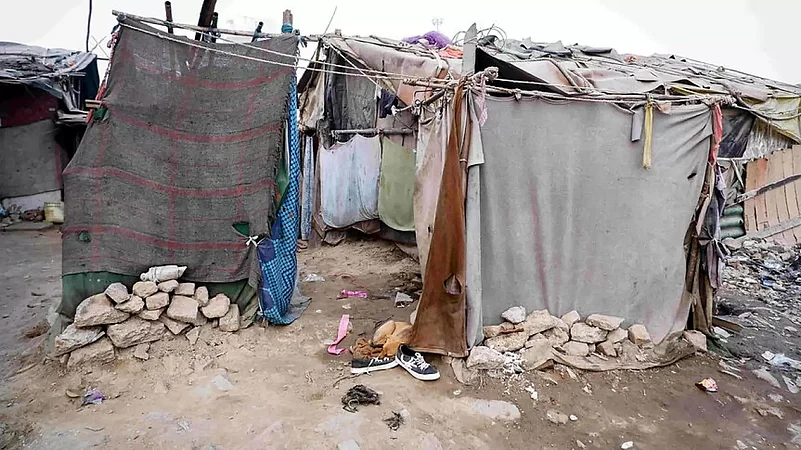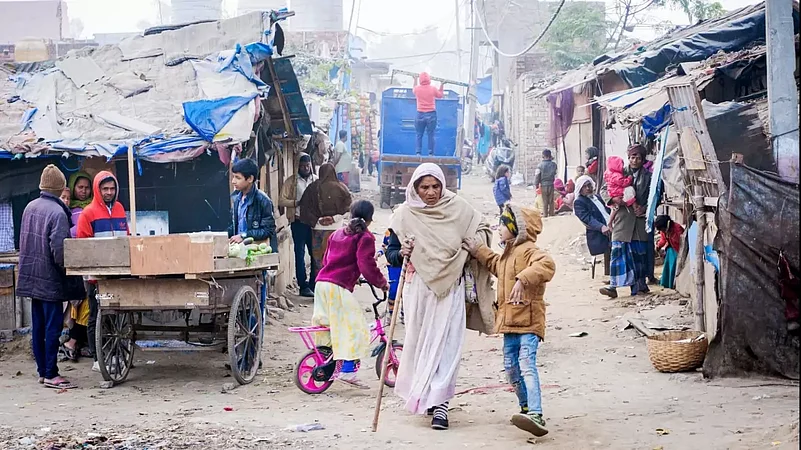Opposite to the historic Shaheen Bagh protest site that brought in global attention during the agitation of the Muslim women against the Citizenship Amendment Act (CAA) in 2019, goes a dusty road- flanked by dilapidated lands, unorganized and scattered Jhupdis, made of scraps and waste materials. After walking around 300 meters through the road in a chilly winter afternoon, we were told to take a left turn to meet 'them'-the people with neither 'home', nor destination- whom one can call taking cue from Arundhati Roy: the 'disposable population' - the Rohingyas.
At Shram Vihar, the persecuted Muslim community of Myanmar, what they colloquially call 'Burma' have been staying for almost a decade now. This is, however, not the first place they came and settled at. “In 2015, me along with my family crossed the border of Burma. We stayed for a few days in Bangladesh and then came to India,” says Mohd. Younus, who is currently 'Zimmedar' (responsible for the community) of 75 families who have come here at different phases since 2012, when the attacks on Rohingya Muslims in their country escalated.
Sitting in front of a small tea shop that he opened in the post-covid period, Younus was reluctant about the chilling cold that forced us to put on layers of sweaters and jackets. “Every year, cold comes and goes. By Allah's grace, we survive. Earlier, during the covid period there were some people who donated things. Now it is even a matter of past. We may survive the cold, but not the mundane uncertainties," says the man in his mid 40s who lives with his wife and a seven-year-old son—"who is too young to go to school."
In 2015, when they were brought here by a truck, there was almost nothing. These were grasslands that they cleared off and started staying. Primarily, he was working as a daily wage laborer and gradually saved some money to open this shop. “Earlier, we used to stay besides the Naala (canal). One day, 'they' came and told us to shift. We, then came to this ground," Younus says showing us the area where one can find people from Bihar, Assam, Uttar Pradesh, Myanmar staying together peacefully.
“Here, all of us from different religions and regions stay together. We don't have any conflict with anybody. What we fear of are the threats of eviction,” he adds. Opposite to his shop, one can see a big brick wall that is seemingly the border between the ongoing construction of humongous apartments and the slum where the 'people like Younus' stay. “We don't know when we will again be asked to leave this space,” says Mohd. Khabis, who is currently in his mid 50s and came to India in 2019 with his four children and wife.
Currently, they pay between Rs. 800- Rs. 1200 per month to the 'owner' of the land where they are staying. “There are around 2-3 people who claim the ownership of the land. But we pay to the person who first gave it to us," Khabis adds. However, behind Younus's shop, we spotted a board of Hindustan Pvt. Limited on a middle-sized iron gate. "There is nothing. But they have marked their land, so that nobody can take it over,” says Younus.

Since they came here, their only recognition lies in the United Nations High Commissioner for Refugees (UNHRC) identity card that the international body gave them. The card in its backside though mentions that “as a refugee, she/he should be protected from arbitrary detention”, their visit to the police station is a regular affair. “Every week, they call me up and I need to go to apprise them of the status of the people- the numbers of incoming and outgoing families,” tells Younus while showing us the documents that give them the “much needed identity” in a foreign land.
However, Younus was rightly suspicious about our presence. “Media people come and go and nothing happens. Rather, they twist whatever we say and then we face the repercussions. We hardly talk to outsiders now. For any meeting, we consult the UNHRC executives and seniors of our communities and then decide," adds the Zimmedar' who was given the responsibility through a secret ballot voting.
In every 2-3 months, they get 25 kg rice, 1 liter oil and sometimes pulses from the UNHRC. “This is the only support system for us apart from the meager earning from the shops,” says Haroon, in his mid 40s, who also runs a small grocery shop that he calls 'home'. Haroon with his family came to Delhi around 2012. However, he could not remember where he came first. What he could recall is they were brought here at Shram Vihar "sometimes later".
“The situation back in Myanmar was terrible. Three people couldn't even stand and talk peacefully. The police may come and pick you up. Here, far away from homeland, we are living in uncertainty, still there is peace. Things are much better here,” adds Haroon.

How are they surviving the bone-chilling cold? “It is common for us. If we have basic facilities of living, we can survive somehow or other," says Khabis who sent his two sons to a tuition and pays Rs. 500 per month for each. “Learning is important. First, I sent them to Madrassas but those were not worthy and then I have sent them to these local tuition classes,” he adds.
They have no clue about the Delhi government's commitment to provide facilities to the homeless people at 195 official night shelters. When asked about Delhi Urban Shelter Improvement Board (DUSIB) and the Rain Basera App through which they can get in to the shelters, Younus tells, “Perhaps these are for the citizens of this country. We are refugees and we don't want to claim the same status. But we are happy."
As we told them that we can call the helpline number and manage them space in the night shelters, Mohd. Khabis looked at us with visible annoyance. “We are fine here. If you can do anything, make sure we are not forced out of this place where we are currently staying,” he says.
As we were leaving the slum with the mercury dropping fast and the cold wave engulfing our middle-class, upper caste bodies that are habituated with the comfort of warm quilts and heater, we met Shahanwaz, in his early 60s sitting idly in front of Younus's shop. Younus sarcastically told him, “They had come to take you to the US!” However, we were not ready for the response.
Covering him properly in the torn shawl, Shahanwaz says, “Insaan hai kahin pe rahe jayenge… (We are humans, can stay anywhere).”
We were too cold to do a story on the misery of 'cold wave'. The words of Younus resonate in our ears, "We can survive cold, not mundane uncertainties."



























